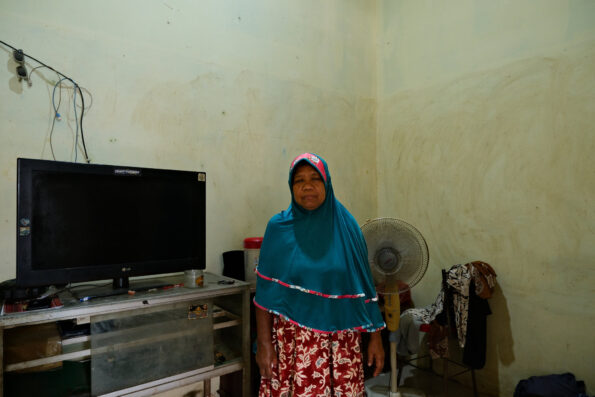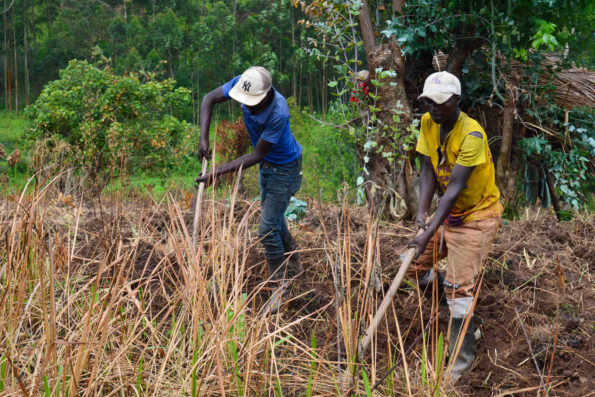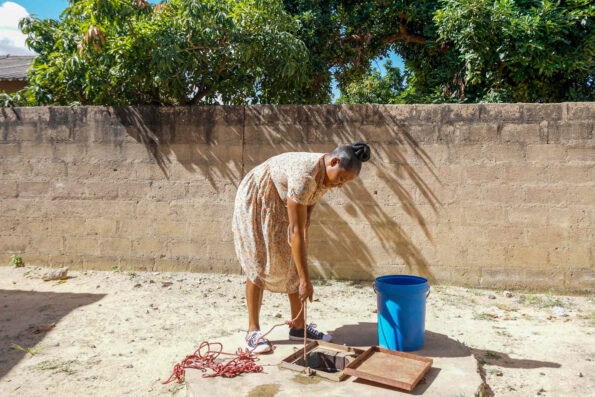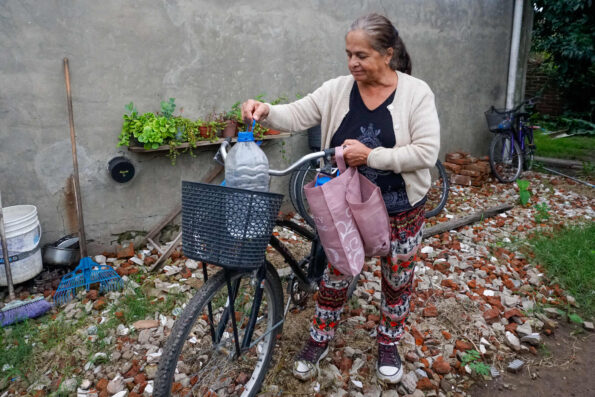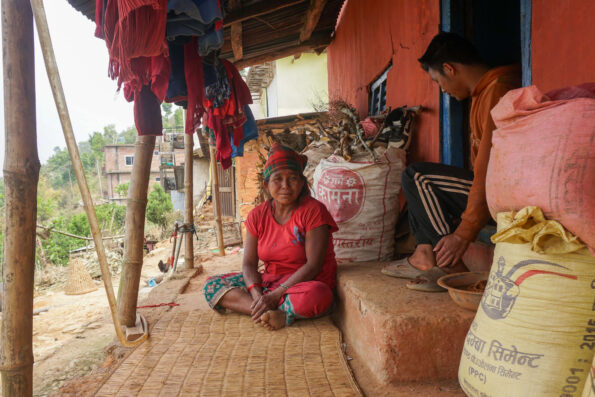
Lucila Pellettieri, GPJ Argentina
Ermelinda Aguirre poses for a portrait on the patio of her home in Villa Inflamable. Aguirre says she moves her bed into the kitchen every time it rains to avoid the sewage-contaminated floodwater that regularly inundates her home.
AVELLANEDA, BUENOS AIRES PROVINCE, ARGENTINA — At the first raindrop, Ermelinda Aguirre hauls her bed into the kitchen, to the only spot the water won’t invade. It’ll still be a sleepless night. If the rain is heavy, water will gush in through the bathroom drain and patio, rising until it drowns her floors. By morning, her walls will be damper than they already are, and the water will have brought in a mix of sewage, garbage and whatever else it picked up along the way.
Aguirre, 58, has lived in Villa Inflamable all her life. The neighborhood is wedged between two of Argentina’s most dangerous environmental threats: the heavily polluted Matanza Riachuelo River and the Dock Sud Petrochemical Pole, an industrial zone home to about a dozen active polluting industries.
For almost two centuries, the river, stretching about 43 miles, has been a dumping ground for contaminants. Some factories that line its shores discard their waste into its waters. Alongside industrial waste, untreated sewage is the main source of pollution. More than 4 million people live in the basin, and 44% lack proper sewage infrastructure.
The polluted water drains into lagoons throughout the area. When it rains, they overflow. Locals have to contend with toxic waste not only outside but within their homes, too — and the situation has worsened as more people have moved in.



In 2008, after years of pushback, Argentina’s Supreme Court ordered the government to clean up the river and provide services such as sewage systems. The Matanza Riachuelo Basin Authority, the agency tasked with this responsibility, known as ACUMAR for its acronym in Spanish, made some progress, including removing some of the waste. But its efforts have been sluggish. The river remains heavily polluted, and the toxic floods keep coming.
Then, in December 2023, President Javier Milei took office. Soon after, his government gutted the agency’s budget in the name of austerity, and ACUMAR halted its work. Key projects — including the construction of a storm drainage system that would help with the flooding — were left unfinished.
Then, in a final blow, the Supreme Court — which had overseen the cleanup since its ruling — ended its supervision last October, forcing residents to restart legal battles that began over 20 years ago.
“I had so much hope before, and now the Supreme Court has disappointed me,” says Claudia Espínola, a community representative from Villa Inflamable, a neighborhood of about 3,000 families.



The Municipality of Avellaneda and ACUMAR declined interview requests.
Residents have no guarantee of when things will change — or if they ever will.
Already, children here have shown dangerous levels of lead poisoning, which researchers have linked to the basin’s contamination. Skin lesions and respiratory problems are also common among locals, says Sebastián Romero, a representative of the Environmental Sanitary Unit that serves Villa Inflamable.



Aguirre suffers from rheumatoid arthritis, which is an autoimmune disease, and asthma, both conditions worsened by humidity. Now, a damp smell clings to everything in her house. Years of flooding have cracked the walls and painted them green with mold.
“[It’s] falling apart,” she says.
Outside, open sewers, where mosquitoes breed and children play, are everywhere. Neighbors lay cardboard or wooden planks over the mud between their houses.
Like many residents, Aguirre has run out of patience with the government’s excuses. Phrases like “in the future” and “in the meantime” now ring hollow, she says. What she wants now, she adds, are real solutions to this centuries-old problem.
Her sister got tired of waiting and abandoned the neighborhood, but that’s not an option for Aguirre or many of her neighbors. She depends on a welfare check and support from her daughter, which barely cover her needs.


Residents will now have to file new legal actions, with each neighborhood potentially filing its own case, which could mean significant delays, says Mariano Hernán Gutiérrez, in charge of the Matanza Riachuelo River work team at the public defender’s office.
Little hope remains for Espínola, but she won’t stop fighting, she says, as she arranges petition documents to resubmit.
Whenever it starts raining, Simón Ibáñez, another resident whose house frequently floods, hoists his 72-year-old mother onto his back and staggers to his brother’s house, which sits on higher ground. His mother has already fallen once, though not during one of the evacuations. He fears she’ll slip and shatter another bone.
“What are we going to do?” he says. “We can’t leave.”
